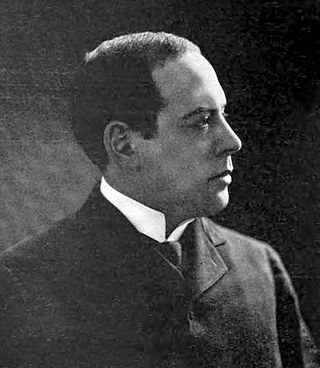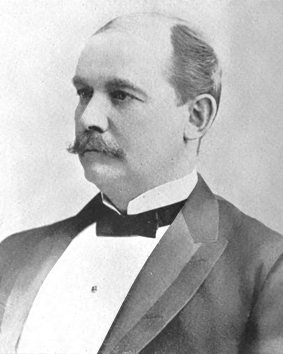
The Metropolitan Opera is an American opera company based in New York City, currently resident at the Metropolitan Opera House at Lincoln Center, situated on the Upper West Side of Manhattan. Referred to colloquially as "the Met", the company is operated by the non-profit Metropolitan Opera Association, with Peter Gelb as the general manager. The company's music director has been Yannick Nézet-Séguin since 2018.

Henry Eugene Abbey was an American theatre manager and producer.

Agnes Booth, born Marian Agnes Land Rookes, was an Australian-born American actress and in-law of actors Junius Brutus Booth, Edwin Booth, and John Wilkes Booth, the assassin of Abraham Lincoln.

James Cassius Williamson was an American actor and later Australia's foremost impresario, founding the J. C. Williamson's theatrical and production company.

Three New York City playhouses named Wallack's Theatre played an important part in the history of American theater as the successive homes of the stock company managed by actors James W. Wallack and his son, Lester Wallack. During its 35-year lifetime, from 1852 to 1887, that company developed and held a reputation as the best theater company in the country.
Alfred Schulz-Curtius, also known as Alfred Curtis, was a German-British classical music impresario who was active primarily in continental Europe and the United Kingdom from the 1870s until the 1910s.

Booth's Theatre was a theatre in New York built by actor Edwin Booth. Located on the southeast corner of 23rd Street and Sixth Avenue, Booth's Theatre opened on February 3, 1869.

Charles William Strine was an American theatrical and opera manager best known for arranging the national tours and residencies of the Metropolitan Opera Company under the direction of Maurice Grau and Heinrich Conried.

The Castle Square Theatre (1894–1932) in Boston, Massachusetts, was located on Tremont Street in the South End. The building existed until its demolition in 1933. The theatre was the Boston home of Henry W. Savage's Castle Square Opera Company, a touring opera company which had theaters in other cities like Chicago and New York City, but took its name from the Boston theatre.
The Garden Theatre was a major theater on Madison Avenue and 27th Street in Manhattan, New York City. The theatre opened on September 27, 1890, and closed in 1925. Part of the second Madison Square Garden complex, the theatre presented Broadway plays for two decades and then, as high-end theatres moved uptown to the Times Square area, became a facility for German and Yiddish theatre, motion pictures, lectures, and meetings of trade and political groups.

The Park Theatre (est.1879) was a playhouse in Boston, Massachusetts, in the late 19th and early 20th centuries. It later became the State cinema. Located on Washington Street, near Boylston Street, the building existed until 1990.

The Tremont Theatre was a playhouse in Boston, Massachusetts, in the late 19th and early 20th centuries. Henry E. Abbey and John B. Schoeffel established the enterprise and oversaw construction of its building at no.176 Tremont Street in the Boston Theater District area. Managers included Abbey, Schoeffel and Grau, Klaw & Erlanger, Thos. B. Lothan and Albert M. Sheehan.
The Plymouth Theatre (1911–1957) of Boston, Massachusetts, was located on Stuart Street in today's Boston Theater District. Architect Clarence Blackall designed the building for Liebler & Co. Performers included Henry Jewett, Bill "Bojangles" Robinson, 8-year-old Sammy Davis Jr., and Bette Davis. In October 1911, the touring Abbey Theatre presented Synge's Playboy of the Western World at the Plymouth; in the audience were W. B. Yeats, Isabella Stewart Gardner and Rose Fitzgerald Kennedy.
Auguste Charles Léonard François Vianesi was an opera conductor, born in the Austrian Empire and later naturalised French. His repertoire consisted mostly of French and Italian opera, in which he directed some of the world's great singers including Pauline Viardot, Christina Nilsson, Marcella Sembrich, the brothers Edouard and Jean de Reszke, and Feodor Chaliapin in the opera houses of London, Paris, Melbourne, St. Petersburg, Boston and New York. He retired around the time when sound recording became commercially available, and he seems not to have left any recorded legacy.

Abbey, Schoeffel and Grau, originally Abbey and Schoeffel, was an American theatre management and production firm. The firm was established in 1876 when a partnership was formed between Henry Abbey and John Schoeffel. Fellow theatre manager and producer Maurice Grau began collaborating with the pair as early as 1880, but did not formally join the firm until 1887 when it became Abbey, Schoeffel and Grau. They managed and ran a number of theatres in New York and Boston, including the Metropolitan Opera House. Abbey was the sole manger and lessee of the Metropolitan Opera during its first season in 1883-4 with Schoeffel uninvolved with the Met at this time. Grau was hired by Abbey to serve as the Met's unofficial business manger during its first season, but did not have a formal title on the Met's staff. Later, Abbey, Schoeffel and Grau were the official co-managers of the Met from 1891 until 1896 when Abbey died. The firm dissolved at the conclusion of the Met's 1896-1897 season, and Grau became the sole manager of the Metropolitan Opera from 1896-1903.
Abbey's Park Theatre or Abbey's New Park Theatre was a playhouse at 932 Broadway and 22nd Street in what is now the Flatiron District of Manhattan in New York City. It opened as the New Park Theatre in 1874, and was in use until 1882 when it burned down and was never rebuilt as a theatre.

Helen Curry was an American stage actress.

Maurice Hermann Grau was an Austrian-born American impresario, opera director, and theatre manager and producer. The Americana: A Universal Reference Library stated that "from 1872 until 1903 [Grau] was the most prominent operatic manager in America". He was a named partner in the US theatre management and production firm Abbey, Schoeffel and Grau which managed numerous theaters in Boston and New York City, including the Metropolitan Opera House. As part of this firm Grau co-managed the Metropolitan Opera from 1891 until Abbey's death in 1896 when he took over sole management of the Met. He remained the manager of the Met until 1903 when he retired. He was also concurrently the manager of the Royal Opera House in London from 1897-1900.

Mary Elizabeth Wieting Johnson was an American opera house manager and philanthropist who ran the Wieting Opera House in Syracuse, New York, after the death of her husband, John Wieting. She oversaw management of the Wieting Opera House and its reconstruction after it burned down for the third time in 1896.

The Academy of Music was a theatre in Buffalo, New York located near the corner of Main Street and Seneca Street. Originally called the Metropolitan Theatre, the performance venue was built and opened in 1852. Its name was changed to the Academy of Music in 1868. The theatre was demolished in 1955.















